
David Benjamin Sherry
“These sacrifice zones of the corporate state are expanding. The recent shooting of an unarmed young black man in Ferguson revealed the insidious disease of white supremacy and how easily U.S. cities can turn into a military occupied police state. With unprecedented persecution of whistle-blowers, the Obama administration continues to threaten press freedom and engage in extrajudicial killing through drone attacks for anyone who is on the receiving end of U.S. imperial foreign policy.
The world is quickly becoming one big open-air prison.”
Nozomi Hayase
“Washing one’s hands of the conflict between the powerful and the powerless means to side with the powerful, not to be neutral.”
Paulo Freire
“-What takes place- in a narrative is from the referential {reality} point of view literally nothing…”
Roland Barthes
“This unfortunate race, whom we had been taking so much pains to save and to civilize, have by their unexpected desertion and ferocious barbarities justified extermination and now await our decision on their fate.”
Thomas Jefferson
1813, on problem of ‘Indians’.
If you took the major institutional equity theatres in major American cities, or mid majors, say population of one million, or a million and a half (Rochester is, after all, a million, as is Birmingham…and neither are considered large metro areas) and you examined the new plays, new work produced at these theatres for the last twenty five years, I am willing to bet you that you cannot find a single work by a playwright who wasnt either a graduate of an MFA theatre arts or writing program (and maybe some were only Enlgish majors or Law), or at least *developed* in house at the theatre in question. In other words, I would guess there are no plays written by Mortuary workers, or truck drivers, or nurses or warehouse workers, or factory workers or kindergarten teachers or ranch hands. Not unless they have gone through the ideological cleansing of an MFA program. Rarely, however, does the working class hear its own voice on stage. But my sense of U.S. culture today is one of utter and absolute homogenization. The plays feature a white core perspective, and they feature an acceptable topical theme, or just pure sentimentalized kitsch that reinforces an identical ideology. They are plays of not amnesia, but of manufactured memory.
There are gifted playwrights out there, its just that they don’t get mainstrage productions anywhere. On occasion a few will make a second stage appearance. And this is a related problem, because theatres dont develop the radical voices, the unsual talent. They may occasionally provide a single second or third stage short run production. They never provide the promise of five years of productions, even small ones. I was fortunate enough to work at Padua. To know I had a home each year. That is nonexistent today. My first play was awful, but I’d like to think I improved. Young writers need that support. Just the knowledge they have a home. What they don’t need is dramaturgs rounding off the edges, sanitizing and shaping their work to conform to the acceptable pattern. I had a dramaturg tell me once I lacked conflict in a play. Now, maybe I did, I can’t say, but the idea was that somehow ALL plays had to contain a certain kind of conflict. But worse, its not the details, its the backdrop, the extant *idea* of a social reality in which we all live. Or should. And one must write in a way that respects that backdrop.
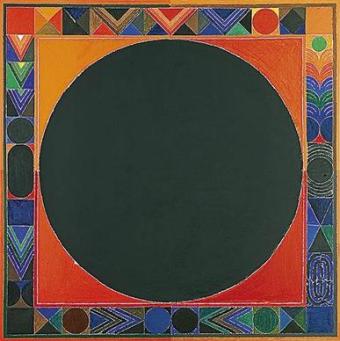
Syed Haider Raza
I have noticed several trends in mass cultural entertainment of late. And I sense something else at work in how certain film and TV projects fail. One trend is the manufacturing of the ordinary. It is, it seems, a necessary construct for white America. Their sanity demands this prop be kept in view. And millionaire Hollywood actors and actresses flock to play, oh, the role of an ordinary junior high school math teacher…in Maine, least diverse state in the country. There is something suffocating in this finely detailed blandness. Oh I am a millionaire but I wish I were a high school math teacher. In a country that now ranks near the top among advanced nations in child poverty, and for whom nearly a third of its population lives right at the poverty line. There are no such places as are imagined in these stories. But August Osage County, and now Olive Kittridge upcoming on HBO are the homogenizing of not just representation, but of history and of community. Once upon a time Theodore Dreiser and Faulkner, and Inge wrote tormented autopsies of the nightmarish claustrophobia of inbred small town America. You drive across the US and stop at a dozen small towns in Idaho, Utah, Kansas, Iowa, Kentucky, Indiana, and West Virginia say, and what you find is unemployment, alcoholism, domestic abuse, bigotry and anger. Its curious how rarely unemployment finds its way into these *white ordinary* sagas so beloved by Hollywood. Or travel to the Reservations, to high plains tribes, what’s left of them, or to the southwestern deserts, and onto Navaho or Hopi land, and what you find is poverty, alcoholism and malnutrition, and government duplicitiy, even now. Or just stop in at the any of the prisons, federal or state. Allenwood, Walla Walla, Victorville, Lee, Big Sandy, Snake River up in Oregon, or Lompoc, Leavenworth or Terminal Island. The state’s super max joints like Pelican Bay and Florence ADX, or the crumbling Orleans Parish, or more crumbling San Quentin or Sing Sing, or the sinister Ely Nevada, which even years ago I remember having a rep as bad as those at Attica or Rikers or Soledad. Then a prisoner rotted to death at Ely, from untreated gangrene, and the public began to, sort of, demand a few small token reforms.

Picnic, by William Inge, original Broadway cast 1953, Ralph Meeker, Paul Newman, Janice Rule.
Inge’s best play is probably Picnic. It is interesting to examine the interior worlds of Inge’s characters to those today found in Olive Kittridge or August Osage county. Or read An American Tragedy, or McTeague by Frank Norris.
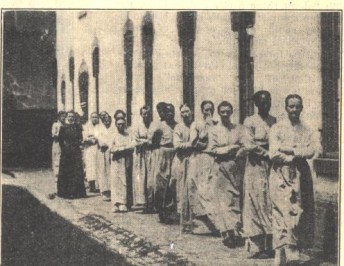
Detroit House of Corrections, women’s division. 1899
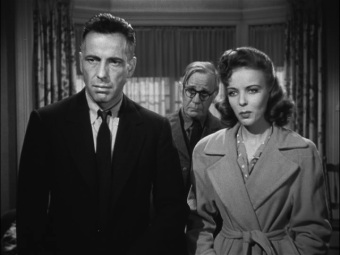
High Sierra (1941), Raoul Walsh, dr.
Now I don’t want to take up too much time on this, for its all rather obvious. Linklater’s Boyhood is an unwatchable exercise in misogyny and, again, this pretend world of white ordinariness. The Imitation Game is a historical bio pic of Alan Turing with the execrable Benedict Cumberbatch, and not having seen it, its hard to know what really to expect. But its possible that it might be interesting. And its directed by Mortyn Tyldun, a Norwegian responsible for two vaguely interesting films in Norway. So I give it a pass, for now. Birdman is more solipsistic cannibalizing of the movie industry, and is really just more white neurosis. Whiplash is a feel good cliche set against elite white privileged education, and Unbroken is by Angelie Jolie, but nobody’s seen it yet. But I mean, what does one expect from the woman who shut down an entire African nation so she could have her baby in peace?Intersteller is the latest Chris Nolen exercise in meta-emptiness (also very white and set in outer space…strip mining Kubrick’s 2001), and finally Clint Eastwood’s An American Sniper. I’m not sure I need to really say anything more about that.
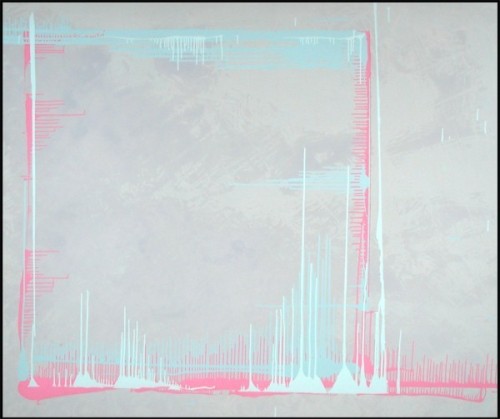
Walter Darby Bannard
There is an interesting discussion to be had that revolves around the fact that there is a good deal of criticism of violence in film and TV. And indeed, the level and saturation of violence is astonishing. But the sentimental drivel that is August Osage County is rarely criticized in terms nearly as harsh. Why? Which does more harm to a culture; The Expendablesor August Osage County, for example? Im going with August Osage County. But perhaps they are inseparable — the coma inducing insulin short fall of August Osage County, and the thrum of gun shots, broken glass, screaming women (or men, less often) and bombs and aging men with too much cosmetic surgery. Is Hannibal worse than The Affair? No, no, I mean finally its not actually. Shakespeare was violent, so was Sophocles. But there was narrative, and video games, or violence porn like Saw, abolishes narrative. Its very important to make and identify these distinctions. For failing to do that starts to erase all art, to turn in the philistines that censor literature and want profanity labels on rap albums. There lurks the latent Puritan.
The reasons that even a show like Hannibal, which traffics in displays of forensic gore, is less destructive than August Osage County, is because at least in Hannibal, there is the innate dignity of narrative, of actors like Mads Mikkelsen or Lawrence Fishburne, who evince a sense of the passage of character from A to B. That human experience is given value through such performative mechanisms. In the saccharine dishonesty of August Osage County, the cliche driven familiarity, the dishonesty of the white ordinary again, or a propagandistic rural America, and of sickeningly syrupy acting — the end result is one of diminishment and insufficiency; that also serves to stigmatize those rural poor who can’t measure up to such representations.
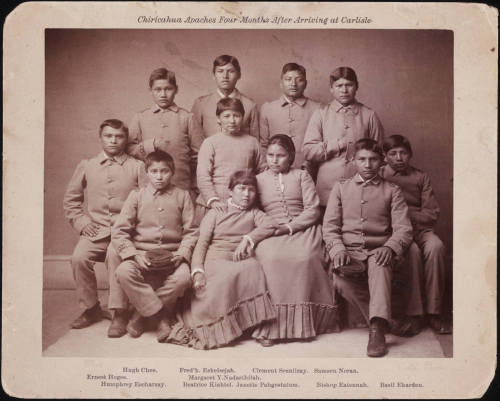
Chiricahua Apaches. Carlisle Boarding school. 1900.
It is hugely destructive to turn to an Osage County, or Olive Kittridge as a cure or tonic for Boardwalk Empire. There is violence and there is violence. One really should not over simplify the question of violence in film, TV, and theatre, or in literature. There is no such thing as some *violence* essence. It happens in narrative contexts, and it happens in the context of anticipation and marketing. I feel nothing but a kind of ulcerous pain internally, when I see Samantha Power interviewed…as a personal example. I feel literally nauseated at the sight of Netanyahu, or Eric Holder, or Antonin Scalia, and I feel a smouldering rage when I read the mannequin left self annointed celebrity scribes such as Molly Crabapple or Laurie Penny. These are the release valves, those who diffuse the anger of the under classes. If art matters, if it does shape the consciousness that is a pre-condition for social change and revolution, then blaming depictions of violence only has cogency if Osage County and the like are at the top of all lists.
Go to google and type in August Osage County trailer. I cant link it here, I just cant. Do the same for Olive Kittridge.
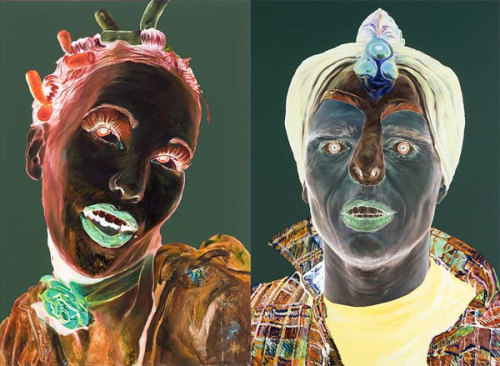
Artists Anonymous
Remember that throughout U.S. history, the story of Native American genocide was ignored, buried, justified, and that even today a football team in the NFL refuses to change the name *Redskin* speaks to the absolute invisibility of this story. I mention this because that process of assimilation that the Native American was forced to endure. The boarding schools (Indian schools) like Carlisle in Pennsylvania, were in essence only exaggerated versions of what education for the poor has always been. As a sidebar on mascots, the Cleveland Indians baseball team is finally retiring the logo nicknamed *Chief Wahoo*, which is, in fact, a far more offensive image than even the Redskins logo. This is 2014, and sports franchises for multi million dollar teams (maybe billion) are still using blatantly racist imagery. Take a moment and ponder that.
 I dont have the same confidence in reforming education that many people I know have, and these are people I respect. But the fact that accreditation remains in place as a guiding principle is reason enough to be suspicious, but beyond that, the very idea of compulsory education has lost the thread of what was once its obvious raison d’etre.
I dont have the same confidence in reforming education that many people I know have, and these are people I respect. But the fact that accreditation remains in place as a guiding principle is reason enough to be suspicious, but beyond that, the very idea of compulsory education has lost the thread of what was once its obvious raison d’etre.
What are schools supposed to be, in theory, doing? Turning out the well rounded humane compassionate tolerant and articulate individuals? The socially conscious erudite skilled and imaginative human? Nobody believes that, few even want that, if they’re being honest. Schools are there to squash creativity, condition students in the acceptance and naturalness of social hierarchies, and in obedience to wealth. Not to the powerful, really, but more to the wealthy. Wealth is its own virtue and with it comes power. There is a sense that all institutions are fully corrupt now. That resistance almost cannot really effectively begin within institutions. It may certainly migrate there, but one of the truths of an aesthetic resistance is that there needs to be a certain radical poetics, an interpretive radicalism, a return of focus to hermeneutical concerns. And the idea of a new attention to culture, to narrative, to image, to art seems important to me.

Andro Wekua
Take as an example the recent *Hollaback* video, which garnered something like 5 million viewings and elicited in the tens of thousands of comments where posted, was also critiqued for the underlying ideology of white supremacy that was its backdrop. This was an obvious case, but in one way it was encouraging that so many recognized the message. The message wasn’t ‘dont harass women’; the message was, white women are at risk from ghetto dwelling black and latino men. There is a sense I’ve been having lately that suggests the white pov, the foregrounded white storyline, the narratives of white problems in a white world are becoming more strident. More panicky. The Hollaback video is not about this white woman walking the streets of NYC. It is about this *white woman* walking the streets of NYC. She is not an everywoman. If she were, she would be many. There would be that shift of perspective from her specialness, to the fungible *woman*, harassed by men, and by men who would be edited to shift the focus from individual to social, from subjective to objective. The video would be about a system of patriarchal privilege that allows for the reinforcing of this privilege in acts of verbal stigmatizing and objectifying and humiliation. That men exert a tacit abusive power over all women. When the image is a particular white woman, with an implied class, and disproportionate numbers of abusive men are black or latino — the narrative elides into one of colonial space and dynamics. Its also serving as a pro-gentrification narrative.
There has been a change in what ideas of ‘topicality’ mean. Topicality is a word used in advertising and promotion, and mainstream criticism or reviewing and is code for self congratulatory. Topical means the theme will flatter the target audience. In theatre today, just as an example, look at Theresa Rebeck’s Zealot, given its world premiere at South Coast Rep in Southern California. Some critics *liked* it, many did not. I have not seen it. But how does such pablum reach the main stage of a major institutional theatre? This is an almost laughably bad sort of CNN version of middle eastern politics. And of course, at the center of the story are a pair of US and UK diplomats. It is seemingly impossible for playwrights today to recognize their own world vision is one borrowed from TV news and earlier films and western journalism. Why write this story? Rebeck is a TV hack and New York playwright with a pretty substantial reputation — but born of what? Quick name me a Theresa Rebeck play.
I cant.

“Indians Planting”, engraving, Theodore de Bry, 1591
But worse is that this is the theatre of faux realism. The representational world as seen by affluent Americans. It is Orientalist and depicts a cartoon image of Islam. I don’t think that this is at all unfair to say. Compare to Genet’s The Screens of sixty years ago, or some of Peter Brook’s work, or even Paul Bowles. Or Margarite Duras. Bowles ‘was’ the white man expat who wrote explicitly about the tensions of white colonial thinking, the harm and the wounds of European erasure of the culture of the colonized. The alienated white tourist. Bowles also said that the Sahara was community. It was mythic too, he called it ‘being close to the absolute’. But he also noted in several interviews, that the desert changes you, but that it changed through an immersion in a kind of community long disappeared elsewhere. Today, in reading the LA Times review, for Rebeck, that community is replaced by western diplomats. The Muslim characters are seen through western eyes. The issues are one’s imagined by a paternalistic West. Making it ‘topical’ is to insert a faux feminist issue about veils. And the form resembles that of a TV mini series (of course Rebeck wrote for NYPD Blue, Law & Order, and Smash). Now, again, I haven’t seen this production, and perhaps it is wildly and singularly different from the other five or six plays I’ve read of Rebeck’s. But that disclaimer should be inserted here. And its certainly possible that every reviewer was missing some deeper point. But does anyone honestly think that a quick scan of the plot points doesn’t convey the truth of what I’m saying? And I’m not picking on Rebeck particularly. It is just that working class and underclass voices do not make appearances on big theatre stages in the United States anymore.
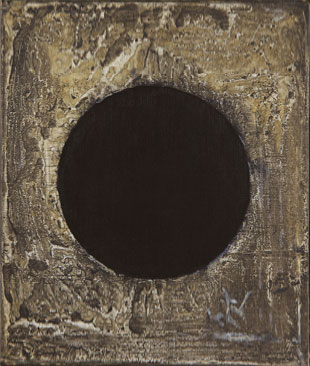
Syed Haider Raza (S.H. Raza)
That today, a William Inge feels radical by comparison is rather remarkable. Clifford Odets dropped out of high school, and founded the Group Theatre. There were many University educated artists attached to the Group Theatre, but the sensibility of their work was left wing politically, and never concerned with ideas of the status quo. A different era, yes, and that’s rather the point. Many of those writers and directors and actors; Harold Clurman, John Garfield, John Randolph, Oscar Saul, Morris Carnovsky, Sandy Meisner, and Joe Bromberg, were later working, even if briefly, in Hollywood — most were children of immigrants, working class, many rose up through Yiddish Theatre, and the influence can be felt in those noir of the forties and fifties.

India Song (1975), Marguerite Duras, dr.
Here is an excerpt from a recent interview with Supreme Court Justice Antonin Scalia, from The New Yorker…
“-Oh. So you don’t know where I’m going. Thank God.–
I don’t know where you’re going. I don’t even know whether Judas Iscariot is in hell. I mean, that’s what the pope meant when he said, “Who am I to judge?” He may have recanted and had severe penance just before he died. Who knows?
Can we talk about your drafting process—
[Leans in, stage-whispers.] I even believe in the Devil.
You do?
Of course! Yeah, he’s a real person. Hey, c’mon, that’s standard Catholic doctrine! Every Catholic believes that.
Every Catholic believes this? There’s a wide variety of Catholics out there …
If you are faithful to Catholic dogma, that is certainly a large part of it.
Have you seen evidence of the Devil lately?
You know, it is curious. In the Gospels, the Devil is doing all sorts of things. He’s making pigs run off cliffs, he’s possessing people and whatnot. And that doesn’t happen very much anymore.
No?
It’s because he’s smart.
So what’s he doing now?
What he’s doing now is getting people not to believe in him or in God. He’s much more successful that way.

Maurizio Cattelan
That a Supreme Court Justice believes in a literal Devil who is out doing mischief, should not be surprising. This is a long ways now from Thurgood Marshall, William O. Douglas, and William Bennett. From a certain perspective, the Warren court is to the government today as Melville is to Jonathan Safer Foer. I’m being glib, and a bit snarky myself, but the nepotism and insularity today in media, and fine arts, let alone Hollywood is actually pretty staggering. Being a slow learner it was only this week that I realized Laurie Simmons was the mother of Lena Dunham. Well, of course, and the father is the stupefyingly talentless Carroll Dunham. (go ahead, google his paintings). This is only worth noting because it is so common. A good many people will suggest that this is really not of much importance, or meaning, or that it is resentful on my part, or that, god knows… but the truth is that culture cannot finally survive this level of suffocating intellectual partisanship. That social networking and family connections, as well as just class, is now so nakedly rewarded ahead of actual talent is the result of forty years of direct attacks on art and artists. It is impossible to imagine The Group Theatre today. Culture is entertainment, occasionally with a *message*, but never threatening, never politically radical, never too serious and never too difficult. It is clever, and snide, and novel and usually loud and bright and narcissistic. It is usually always misogynistic. It conforms to a white world view, an Imperialist world view, and it is endlessly familiar, and solipsistic. It is the imaginary manufactured *ordinary* presented with a wink as *extraordinary*. This coy nod to the common folk is a feel good ploy by the ownership class. The truth is that today the cultural gatekeepers are an increasingly narrow and privileged class, most of whom regard culture as something of a hobby, but always with an eye to profit. Whether they even admit it to themselves, it is a province cleansed of the unruly or uncontollable, or subversive. Today film and theatre operate cannibalizing earlier versions, or earlier iconic works.
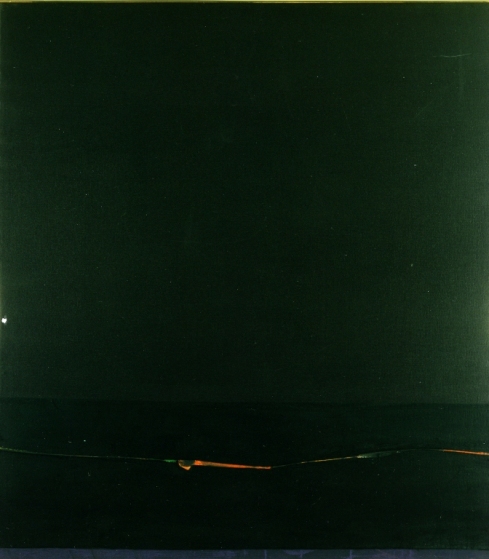
Edward Corbett
Take Kubrick’s 2001 A Space Odyssey. It is sometimes to easy to forget just how influential this film was. How it has shaped several decades of how the public imagines outer space {sic} and created the stylistic template for all future science fiction. It was almost a new genre onto itself. I am not a gigantic Kubrick fan, but there is no question that his artistic integrity seems even larger now than during his lifetime. I suspect Tarkovsky’s difficulty with 2001, and his decision to make Solaris as a sort of critique of it, was a deeply felt instinct, and a correct one. For in ways unintended I think 2001 has become something that fused certain latent dreams in much of the collective US psyche, and whose style code has been appropriated by the military itself. The slightly kitsch elements in it, from the ape costumes to the acid flash back corridor, are now the stuff of countless cheesy sci fi films, but the more elegant elements, the neutered emotionless HAL voice and the equally emotionally withdrawn Keir Dullea, seemed to have infected the dream life of the two generations, or three. The genius of the film is really in the sense of meticulous care that went into it, and in the rhythm of the editing, the duration of each scene. It is a hugely formal film, but it is also ambitious and grand in design. Not as an expression of neurotic problems masquarading as myth (ala Terrence Malick), but a truly sort of relgio-mythic monolith in its own right. Its how I have always experienced the film, as Kubrick’s own totem making enterprise; the movie becomes as enigmatic and seamless as those monoliths themselves.
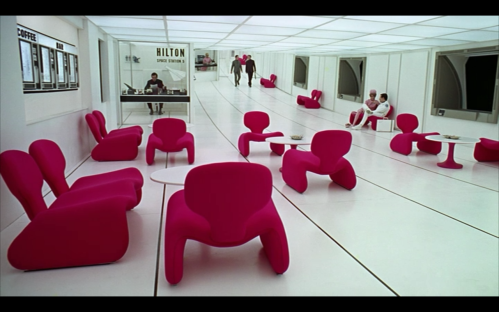
2001; A Space Odyssey (1968)…Stanley Kubrick, dr.
Kubrick’s intelligence is what separated him from his imitators. And that he recognized that unseen forces shaped the world, forces outside his own subjective concerns. And, honestly, I don’t think he ever made a film he should feel ashamed of or made for pure profit. But to lead this back to the homogenizing of culture today, I am willing to bet that one cannot find a space narrative made since 1970 that does not predicate its vision of space on the Kubrick. Kubrick may well have shaped how NASA imagines space.
The biggest problem though, for homogenized culture, and not entertainment — lets pretend we can separate them — is that it adheres to and draws from this fake reality. There is a curious contradiction at the heart of this *small town* realtiy ala Olive Kittridge, and that is that small town rural America is also the butt of endless jokes, and the location for slasher and psycho killer films. Countless numbers of them. *August; Texas Chain Saw County*. So there is this coy wink, this slight nudge, when the idealized small town depiction comes on. For deep down the manufacturers of these films hold such locations, the real versions, in contempt.
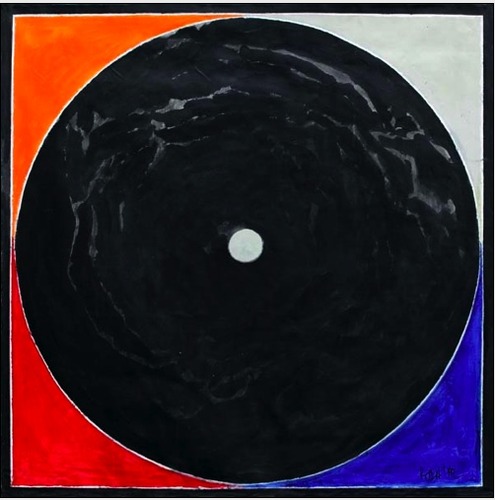
Syed Haider Raza (S.H. Raza)
Often I think it is just that seriousness scares today’s producer and public. I’ve posted three pieces by the now 92 year old Syed Raza Haider, originally from Madyha Pradesh, but longtime Paris resident. The devotional mathematics of Haider, the geometry that encases the void. When I look at Haider’s work I often think of Kubrick, perhaps oddly. I think of Kenneth Noland too. But I think bindu, the point of focus in a sacred geometry of Hindu philosophy, as well as the Kaballah, is expressed in a care for the single detail out of many. The geometrician at work, as Blake drew God, the builder of the Universe. For the artist, there must be a silence behind each sound, veils behind which secrets are to be found, or not. And in narrative there must be an ability to transcribe something of the tragic and suffering of the vulnerable.
I wanted to bring this discussion back to the topic of violence again.
“Violence in movies today is as peculiarly affecting these days as stupidity.” writes Timothy Bewes. And his discussion of it touches a bit on what I was writing above. He continues…“Fear of violence in postmodernity renders all action violent and all violence erotic.”
In a society of acute, and often immaterial control, of endless obfuscation and neutralizing of dissent; the expression and/or representation of violence feels a bit like that frozen moment, the Naked Lunch, the distillation of recognition of the super or meta enclosing of daily life. There is a line from Shakespeare and Marlowe through Dostoyevksy and Kafka and Melville, in which narrative cannot escape its own personal psychic trauma, and its relationship to legal state violence and domination. In narrative Ive called this ‘primal crime’. The lack of it, the substitution of neurotic bourgeois concerns of marriage or property or career feel oddly more damanging psychically and certainly eerie in that post modern way of suggesting ur-passivity. Walter Benjamin touched on this idea of legal violence, in his essay Critique of Violence. The appeal of violence, its erotic appeal, is not just the process of numb inducing repetition of the same, but also because its an expression of defiance to the regulatory state.
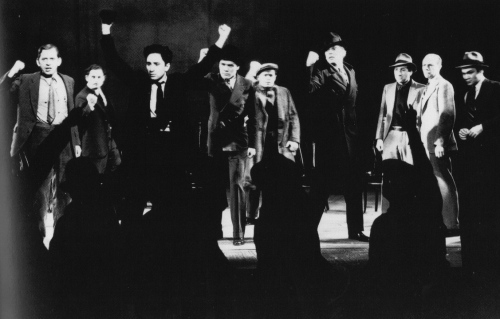
Waiting for Lefty (1935), by Clifford Odets. Group Theatre.
Violence that takes place, representationally, outside a state framework tends to be treated, narratively, as criminal. State violence is righteous and protective. Fear of the outside. Now, this is only one register, for in another way, there is a de-sensitizing assault of non stop images of violence and death and pain that are only expressions of pure titillation. But how does that work? How do images of violence get marketed? They are marketed in an overall strategy to instill fear and suspicion and distrust in people about other people. That is the actual dark side of the *individualizing* theme. It distracts from the real enemy which is the system of domination in place. Of capitalism.
Bewes cites Hegel, the ignoble or disrupted spirit, realizes the dialectical movement of true Spirit. Now, this was the Dostoyevskian Underground Man in a sense. There is much to dissect in all of this, but here my point is only that art is not real life. We tell each other stories not to reinforce equilibrium, but to tear it apart. Not all violence is the same, and without transgression, there is no radicalism at all.

What you say about the destruction of any portrayal of the working class is exactly right. And not just in terms of artistic production, but even just kitschy entertainment. There’s no more West Side Story, for example. It’s just a complete erasure of any ability to imagine anything beyond the echo chamber of glitzy showbiz environment. My favorite (cough) example is the TV series “two broke girls” where being “broke” is having a really spacious apartment. I suspect people (unless they’ve lived it) have stopped being able to recognize poverty if it bit them in the face. they certainly won’t if TV showed it, unless as something that happens ELsewhere, in India and Africa but certainly NOT HERE. And it’s a reflection of the gentrification of life — it’s the control of the spheres of movement. If you’re rich enough, you can live your life without having to come into any contact with poor people. They can literally be erased from your sight, because sights nowadays are commodities too.
I recall in Oxford being given advice (by the powers that be, I guess, I dunno), not to give money to homeless panhandlers. And I suppose the impetus is image management — gotta keep the city clean for the tourists or they won’t come, and the city loses money on that. So that’s what it’s boiling down to. There are no more private spaces, nor communal spaces — only advert sets. Every place is a studio stage, essentially.
Anyways. Just rambling. Out of curiosity why do you consider “August Osage country” sentimental? Granted I don’t think it’s a good play (I did when I was 16, but then again my taste — if you could call it that — then was very rudimentary), but it’s also about a messed up family who treat each other like shit. Out of all the problems you can pick with it, I don’t see how “sentimental” fits into the scheme? Or maybe I’m just using the word in a different sense from you.
@exir….
I think you sort of answered your own question. Osage is sentimental firstly because of the form….its this very old fashioned relic of a formula that posits a norman rockwellian world into which these people come and are mean to each other. But its again, in a studio set of a place. I saw Fincher’s new film Gone Girl last night. Its a fascinating film, finally sort of bad, but the biggest issue besides Affleck, is that it doesnt take place in Missouri……….they is no sense of place at all. It takes place on a back lot somewhere. There are signifiers for place (Affleck wears a Cardinals baseball cap)….but thats it. People will rave about it i expect if for no other reason than a cop calls something *meta*……har har…..kewl.
So Osage is this sentimental formula………..and it posits some Norman Rockwell vision of family, and rural life. I mean, how is it NOT sentimental? Dictionary definition:
of or prompted by feelings of tenderness, sadness, or nostalgia.
Right………..well, nobody is being tender, but nostalgic for sure, again additionally in form, and this disproportionate melodramatic sadness…..bathos. That to me, anyway, is sentimental.
wow this is one of my favourtie posts here.
i have so much to day but I’m just going to start with violence
So much violence but really no violence in films today./ I saw the wonderful Z by Costa Gavras the other day; the beating in the head of Yves Montand was actually filming violence, producng violence. The violence in films now is absurd and produces a completely different effect. Because violence as handled by Z does not desensitize or normalize let along eroticize, it sensitized you, it has something to say about Violence., But the films for boys now with all the decaptiation and blood and those sound effects of slicing and gushing is something rreally odd and is meant to detach people from reality. And the result is people didn’t know they werent seeing a beheading in the foley and sotloff videos. The kids really didnt seem to know. They seem to really believe they saw a beheading. And this despute also being exposed to all this stuff on youtube, the real snuff films that flood socmedia.
Carl Schmitt also believed in the literal Satan literally at work in the world doing evil with his posse the Jews and the English. Scalia may be pretending to believe it but Schmitt really believed. Everything he wrote is childish and absurd as well as depraved and yet academics now venerate him.
The hipster media ifs full of this new weird genre — because anything empty like fake diet potato chips is preferable to anything requiring concentration on these webzines — of “artists” giving advice about how to “make it.:” Amazingly these are all shit shitty less than mediocre artists, so really all the advice they can give is about marketing, They’re selling whatever, just some shit, and so they advice tou to produce some shit, whatever it is, doesn’t matter, and sell sell sell. And that’s the artist’s perspective now. The definition of an artist is becoming someone who is unashamed to say this crap they churn out is “art” and who has expertise in findraising and self promotion. It;’s not even hidden, it is boasted of. Neil Gaiman is a real villain, a kind of culural criminal really, responsible for a lot of infantilization. His stuff is so childish it is really as if made by a child with basic adult experience. But I guess he is less responsible for than the beneficiary of the massive deskilling and de-cultivating and de0-educating of the citizenry of the imperial core.
When things appear that have some thought and craft I am amazed, they seem miraculous. Very few are recognized in any way. A children’s book was: Octavian Nothing. It’s a good children’s book, oits beautifully written and its about something serious; many serious things. And it’s complex and mature. Inchuildren’s literature I guess this can be permitted. I can’t get over the sheer crapness of Gone Girl and An Untamed State…on top of the reactionary propaganda there is just incompetence. And everywhere now I see youths speaking Crabapplese “me and him drank whiskey”; I see grad students in literature and university profs saying that. The loss of language skill even in one’s mother tongue is going to enslave people,cut them off from everything but the tteet of Murdoch feeding them simple images provoking irrational responses that substitute of thought and understanding.
Just watched Vivre Sa Vie by Godard today. It’s when you experience sublime moments like these, where suddenly everything is illuminated, that you wonder why you’d ever want to bother and settle with inferior art. Wouldn’t you want to live in that heightened state forever? Why bring yourself down into the mud?
I had just started my third attempt at reading August: Osage County when your post went up. This coincidence is the reason I will probably finish it this time.
Along with the sentimentality of play there’s this narrative around it of Lett’s creating a play on the order of Long Day’s Journey into Night or some other equivalent to a “Great Piece of American Drama.” There’s a nostalgia that hangs over it. A belief that a “Great American Drama” can still be written and that Broadway still matters (that the play reaches back to some Golden Age). It’s an echo. Of Albee. Of Shepard. It doesn’t approach Who’s Afraid of Virginia Woolf or Curse of the Starving Class. There’s nothing in August that comes close to that lovely, despairing, prescient monologue of Weston’s in Act 2, ii.
WESTON: I remember now. I was in hock. I was in hock up to my elbows. See, I always figured on the future. I banked on it. I was banking on it getting better. It couldn’t get worse, so I figured it’d just get better. I figured that’s why everyone wants you to buy things. Buy refrigerators. Buy cars, houses, lots, invest. They wouldn’t be so generous if they didn’t figure you had it comin’ in. At some point it had to be comin’ in. So I went along with it. Why not borrow if you know it’s coming in. Why not make a touch here and there. They all want you to borrow anyhow. Banks, car lots, investors. The whole thing’s geared to invisible money. You never hear the sound of change anymore. It’s all plastic shuffling back and forth. It’s all in everybody’s heads. So I figured if that’s the case, why not take advantage of it? Why not go in debt for a few grand if all it is is numbers? If it’s all an idea and nothing’s really there, why not take advantage? So I just went along with it, that’s all. I just played ball.
This was written around 1978 (I believe).
first…..@molly:
Great comment. The violence, yes. I mean its even the term now, the word, ‘violence’. It almost has to have scare quotes around it, its post modern “violence”. Violence violence. But there is murder, there is blinding, there is torture or maiming or branding or beheading. And its all different. In different contexts. I dont want art without violence for christ sake. Im not tipper gore. But using your example…Z………or my favorite, Army of Shadows…….look at the execution of the collaborator in Army of Shadows. Its just so disturbing, so profound, and its profound for the men in that room. Or In a Year of 13 Moons, the scene at the slaughter house. Or Killer of Sheep. These are investigations of violence and its ripples. So now with The Walking Dead, say….endless amplified sound, foley artists working overtime on gristle and bone shattering sounds. its Disneyland. Its Pirates of the Caribbean …… and its numbing of course. Real violence is not erotic. At all. For soldiers i can image a certain adrenaline rush………but i saw a man stabbed once in LA County Jail. We were all on chain going somewhere….but as was often the case we were halted and standing against a wall across from the trustees tank. And a guy got shanked. With a toothbrush………..and he just fell over. Didnt break his own fall. I guess he was dead already. And a guy near me threw up. I almost did. It was very disturbing. And these were not painty waist frat boys, trust me. It disturbs EVERYONE. I am sure there are a few, very few, psychopaths who find it NOT upsetting. But the point is that 99.9% of people do. So I happen to think that this cartoon violence is linked to sentimentality. The sentimental kitsch of most Hollywood junk is a form of violence. It degrades humans in a similar way. So of course, now, in media, in news, in VICE and SALON and whatever, you have the purveyors of hipster porn…….another thread of titillation. And its often partaking of one of these above. And these hacks…the molly crabapples or laurie penny/’s are not journalists…they are all of them performance artists. And they want favor with the court. All of them. They want, somehow to be cool, but offend the court, not offend the master or overlord. And now the audience for this, most of whom dont know violence………they think everything is a game, a video experience……networking………and mostly they want to be a brand of cool. God these people work so hard to be cool. So so hard.
@elizabeth……….i know that monologue. Its beautiful. ITs a beautiful play actually. Also, thats right about August OSage……..its this meta sentimentality in a sense…which you suggest. It creates its own fake history. Its own legend…..by the carefully worked context it creates. Just god awful.
@exir………..yeah……well, Im writing about Gone Girl for next posting. And a few other things…including that sublime. What i wish is that i could see Godard’s new 3 d film………geoffrey o brien writes about it in the NYRB………..it sounds rather amazing.
thanks john
yes and this exciting erotic pseudoviolence, this strange spectacles which are all about concealing violence while they pretend they’re about replicating and exposing violence, help sustain this hideous proprietor-supremacist anthripology where they paint the poor who live surrounded by violence as becoming inured or desensitized to it. This is a way of denying all the constant trauma (afflicting black and latino boys and men especially in US) and justifying the brutality of prisons. Oh they’ve been around violence from day 1, they’re used to it. In fact people don’;t get used to it. PTSD is a framwork the official discourse is happy to apply to white gentry, it belongs to this white normality you describe here, the gentry who are understood to be traumatized by violence, that they experience and that they inflict. But the vermin population is callous and unfeeling.
I read a play of Rebeck’s recently; all her plays have this kind of enticing pitches, the short description makes it seem like its going to be really clever and goodm, and everything is cheap subMarshallBrickman/NormalLear one liners, the obvious, the cliche. She ensures her reputation by writing roles actors want to play because they can show on stage trhat they can walk into a tv series, they have all the ticks and tricks down, and she writes these cliches long speeches to exhibit their command of this with. But the vapidity is amazing, and the twice removed. Because its not postmodernly removed from reality, as you say, its copies of sitcoms pretending to be Zola.
It’s interesting you mention Army of Shadows, since in many ways, Melville was essentially a genre filmmaker in the best sense of the term, and in every single one of his films, the theme seems to be social renegades being overpowered by the Man, with the viewer always being put in a position of rooting for the renegades (i.e. the gangsters or the robbers) over the Man (i.e. the cops). Nobody wants to see Borvil win the battle over Alain Delon in Le Cercle Rouge just as nobody wants the aging gangster in Bob Le Flambeur or Becker’s Touchez pas au Grisbi to fail at his last score before finally settling down, yet the message is that power wins over social rebellion in the end, although the other side of the law never really comes into play in Grisbi.
And this point is never brought home more clearly than in Army of Shadows when the Resistance fighters led by Lino Ventura, an actor who made his name playing gangsters, are portrayed as the “robbers” while the Nazis become the “cops”.
Hello John – I’ve never written here before but I enjoy reading your articles. I was intrigued by your reference to “the execrable Benedict Cumberbatch”. Care to expand?
You’re not wrong by the way. He was insufferable in “Sherlock”. But then the scripts were by Steven Moffatt whose writing may also be fairly described as “execrable”. Certainly, full of embarrassing displays of schoolboy macho “wit”.
as an example for what is the artists anonymous work on display~? aa
I’m not sure I understand.